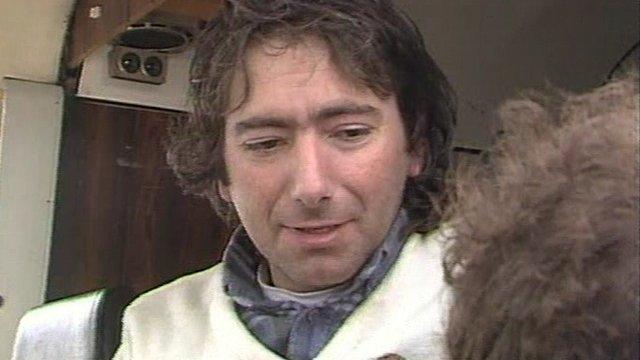Reluctant superstar: Remembering Joey Dunlop
- Published
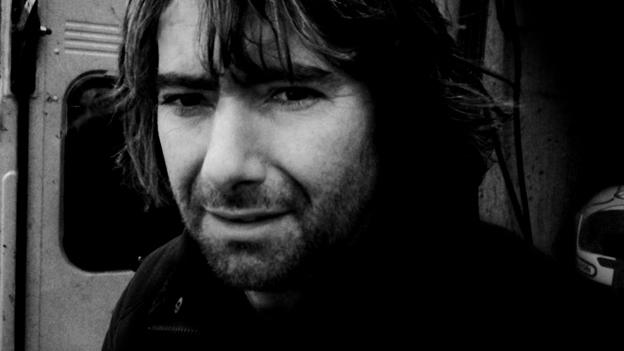
More than 50,000 people gathered around the tiny Garryduff Presbyterian Church in Ballymoney, County Antrim, to bid farewell to a true sporting legend.
Road racing is the toughest of sports and requires hard men. But many of these hard men were unashamedly in tears, heads bowed, saying their final goodbyes to the unlikeliest of sporting superstars.
As the funeral of Joey Dunlop, external got under way on 7 July 2000, people were still trying to come to terms with the fact that the seemingly indestructible road racer had been killed in a minor race in Estonia five days earlier at the age of 48.
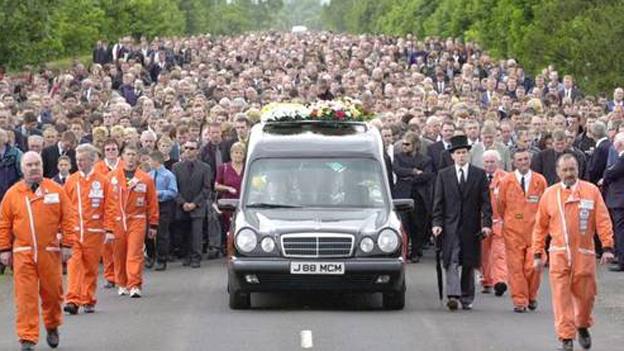
Fifteen years on from that emotionally-charged day, some of those close to Joey having been reflecting on the legacy of this shy man who hated the limelight, but whose popularity was such that in a recent poll conducted by the Belfast Telegraph, he was voted Northern Ireland's greatest ever sports star, ahead of the legendary George Best.
"Northern Ireland's greatest"
Liam Beckett, a BBC pundit and Dunlop family friend, believes this accolade was fitting.
Jim Neilly reports on Joey Dunlop's victory in the final race of the North West 200
"Joey was quite simply the greatest at what he did and he always did it with the absolute minimum of fuss."
For Liam Beckett, it is this combination of Joey's iconic stature alongside his shy, unassuming persona, which ensures his popularity endures.
"Joey was always uncomfortable when being showered with adulation. He was much more content when in the company of his family and close friends. In many ways it was these 'down to earth' qualities which endeared him to his legions of fans."
Throughout the Troubles in Northern Ireland Joey remained apolitical, attracting loyal support from Catholics and Protestants alike. Famously superstitious, he always wore a red t-shirt and a yellow crash helmet.

Joey Dunlop and his brother Robert competing at the North West 200 in 1990
Humanitarian
Joey's racing triumphs, including five consecutive Formula 1 World Championships, 26 Isle of Man TTs, 13 North West 200s and 24 Ulster GPs, were well documented, but throughout his life Joey's charity work was less publicised.
He would regularly load up his van with food and clothing and drive across Europe to deliver parcels to the orphans of Romania, Bosnia and Albania. Typically, this was done without any fanfare.

Joey in 1992 as he prepared to travel to Romania with his van full of food and clothes for the orphanage
Siobhan Carter, who volunteered at one of the orphanages Joey visited in Romania, has been reflecting on the major impact he made there.
"Joey's visit raised morale greatly with the staff and children. For me, seeing someone from near my home town in Northern Ireland, arriving with supplies which he had personally struggled to deliver to his destination, without translators, and sleeping alone in minus conditions in his van, touched me greatly", she said.
"I do believe Joey received a calling to help others following his visit and that led him to make many future trips to help in orphanages."
Joey was awarded the OBE for his humanitarian work in 1996 and he described it as the proudest moment of his life.
Posthumously his charity work continues through the Joey Dunlop Foundation which receives donations from around the world.
Tragedy in Tallinn
The risk of serious injury or death is a constant companion of the road racer, such is the perilous nature of the sport. But given that Joey had survived for so long, it was still a huge shock when he was killed, external while leading a 125cc race in wet conditions in Tallinn, Estonia on 2 July 2000.
He had spent his last night on earth sleeping across the front seats of his van, eschewing the hotel suite that had been laid on for him.
Liam Beckett remembers the events of that day well.
"Joey's youngest son Richard had stayed overnight at our house, as he and my son William are best friends. We had just finished Sunday dinner when I saw Joey's daughter Donna come speeding in my driveway. She was in floods of tears and in seconds I could hear a commotion with my wife Gillian shouting 'no Donna, no'. That is how I received the dreadful news."
Outpouring of grief
Motorcyclists came from as far afield as Australia, Japan and South Africa to attend Joey's funeral, riding in noisy formation. So many stood in the tiny country lanes around Dunlop's modest bungalow that it took the undertakers an hour to carry him through the crowds to complete the mile-long trip.

Mourners packed the roads as Joey Dunlop made his final journey
"A stunned silence and a sense of real disbelief had descended over the entire country, and beyond," said Liam Beckett.
"The people's hero was gone and the outpouring of grief was a spectacle which I feel won't be repeated in Northern Ireland."
Dunlop dynasty
Although Joey's brother Robert, another motorbike legend, was killed during practice, external at the 2008 North West 200, Robert's sons Michael and William are ensuring the Dunlop dynasty remains at the forefront of road racing.
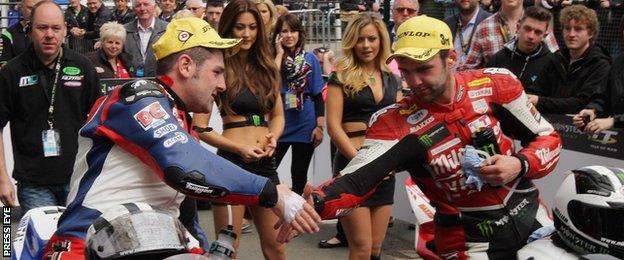
Brothers Michael and William Dunlop
William Dunlop, speaking last year shortly after breaking his leg at the Isle of Man TT, was typically matter-of-fact about the risks involved.
"I got away with it last time and as soon as I was well again I jumped straight back on a bike," he said.
It's a great life being on the edge all the time. I don't care - I guess that's what it is. Maybe if I had a kid that might change me. But I can't see it."
The Dunlop dynasty - Victories in Isle of Man TT, North West 200 & Ulster Grand Prix | |||
|---|---|---|---|
Joey Dunlop | Robert Dunlop | William Dunlop | Michael Dunlop |
IOM TT: 26 | IOM TT: 5 | IOM TT: 0 | IOM TT: 11 |
NW 200: 13 | NW 200: 15 | NW 200: 3 | NW 200: 4 |
Ulster GP: 24 | Ulster GP: 9 | Ulster GP: 7 | Ulster GP: 6 |
The story of the Dunlops has been told in a recent documentary, the highly acclaimed Road, in which Joey is the star.
Legacy
Joey Dunlop is the man with the common touch who became a sporting icon and who in death has become a mythical figure.
Liam Beckett believes his legacy will live on: "Joey is still revered throughout the world as the quiet country lad who went on to become the greatest motorcycle pure road racer of all time. Quite simply there will never be another Joey."
For Siobhan McCarter, his charity work should not be forgotten.
"For me Joey's legacy is the definition of a humanitarian - a person who sought to promote human welfare."
"He appeared to live a life where all people he met, regardless of class or creed, were special to him as a human being."
As for the man himself, what would he want his legacy to be? Joey once said how he would like be remembered:
"I never really wanted to be a superstar. I just wanted to be myself. I hope people remember me that way."
- Published9 February 2015
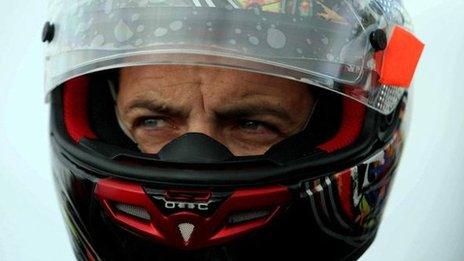
- Published3 September 2014
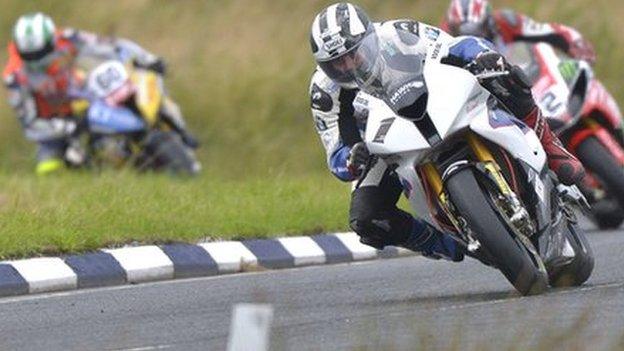
- Attribution
- Published14 May 2015
